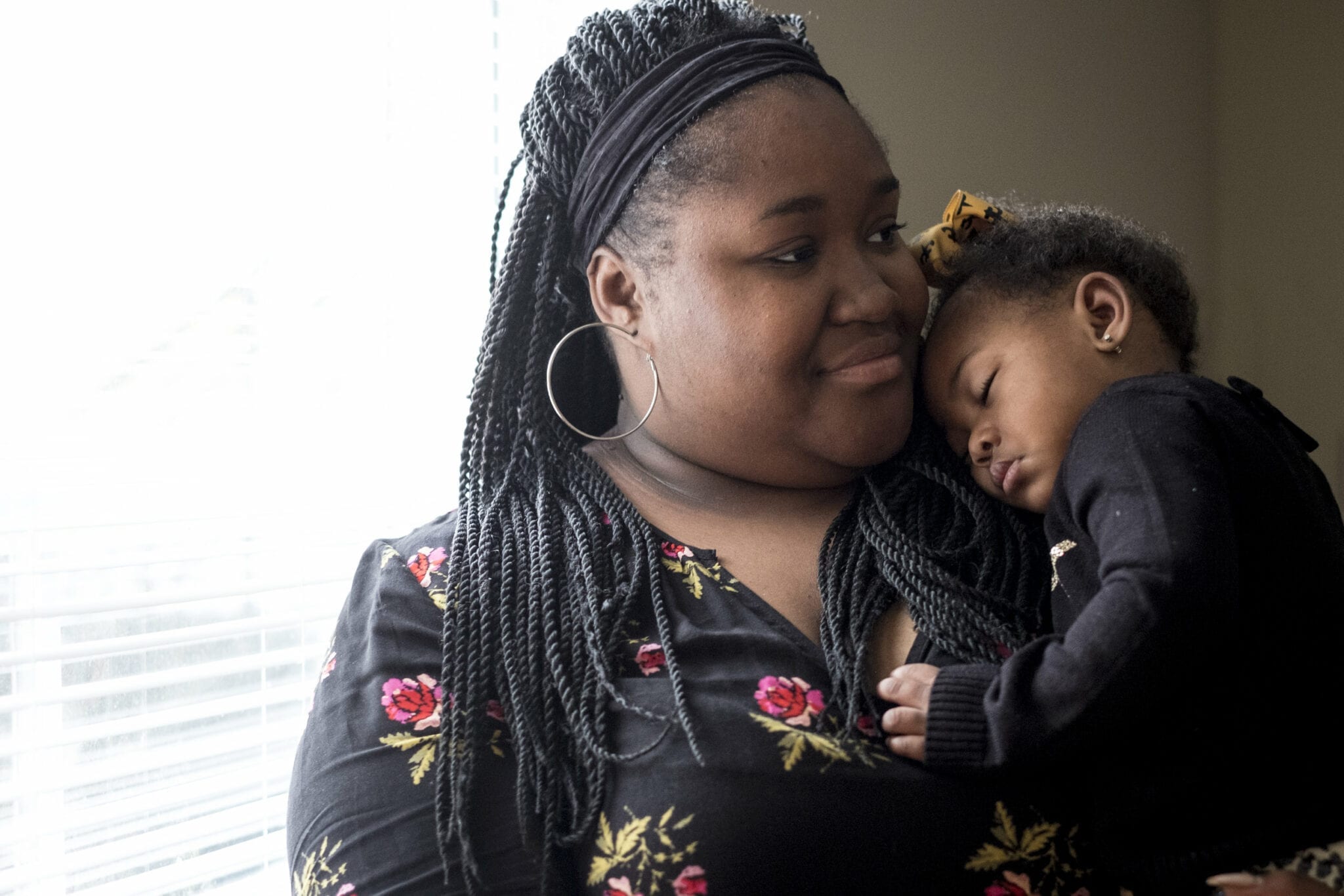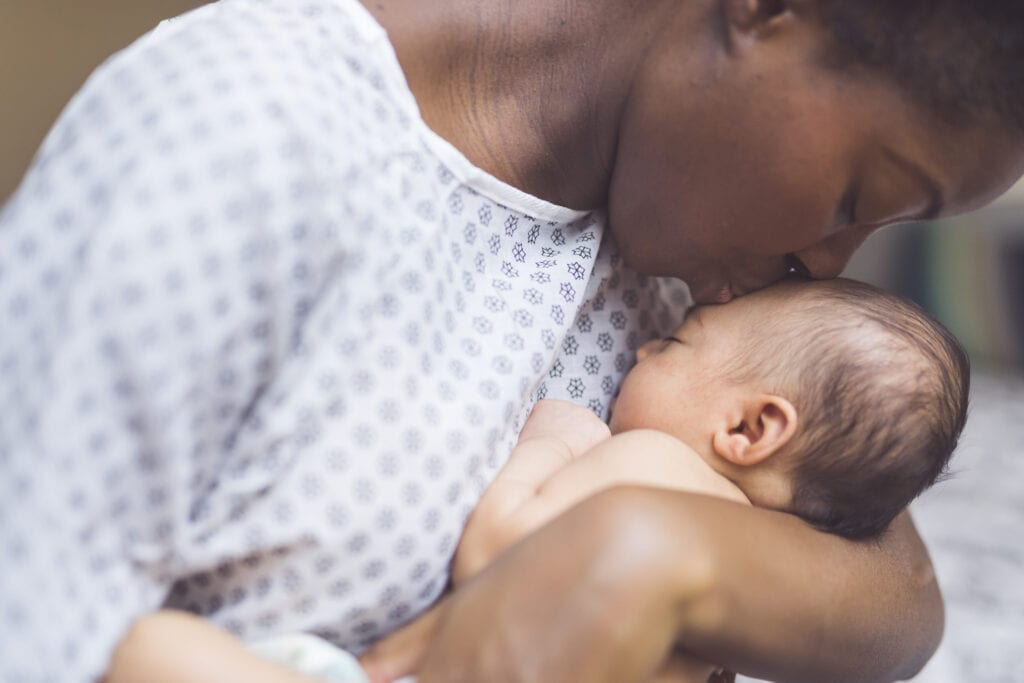Center Cheers Reintroduction of the Black Maternal Health Momnibus Act in U.S. Congress
Members of House and Senate reintroduce suite of Center-backed bills to improve maternal health care, particularly for Black and Indigenous women

The Center for Reproductive Rights joined partner organizations to support today’s reintroduction of the Black Maternal Health Momnibus Act of 2021—a package of 12 bills to advance inclusive and accessible maternal health care, especially for Black and Indigenous people who are most impacted by the U.S. maternal health crisis.
The Center was deeply involved in the coalition effort to create and advance the Momnibus, providing legal expertise, analysis, and technical assistance in crafting the legislation. Through its Maternal Health & Rights Initiative, the Center advocates for laws and policies to improve access to safe and respectful maternal health care, like the Momnibus.
“This bill package is critical and long overdue. It’s unacceptable that mothers in the U.S. are dying at the highest rate of any developed country, and those mothers are largely Black and Indigenous,” said Jennifer Jacoby, Federal Policy Counsel at the Center for Reproductive Rights. “The Momnibus signals to Black and Indigenous birthing people that they will not be left behind any longer—not in this pandemic, not ever. Congress must act now to pass this much-needed legislation.”
The U.S. is facing a worsening maternal health crisis marked by high rates of maternal mortality and morbidity, especially for Black and Indigenous birthing people who experience far higher rates of pregnancy-related death and complications than their white counterparts.
The Momnibus of 2021 is being introduced in the U.S. House of Representatives by members of the Black Maternal Health Caucus, including Representatives Lauren Underwood (D-IL) and Alma Adams (D-NC), and in the Senate by Senator Cory Booker (D-NJ). The Momnibus was first introduced in 2020 with Vice President Kamala Harris as the lead sponsor in the Senate.
The Momnibus
The bills that make up the Momnibus are designed to complement other maternal health legislation awaiting action in Congress. The Momnibus addresses many aspects of the maternal health crisis through research and funding, including investments in factors that contribute to maternal health outcomes like housing, transportation, and nutrition and in community-based organizations.
The Momnibus also includes measures to strengthen the maternal health workforce, improve care for people who receive maternal health care through government agencies, such as veterans and incarcerated people; promote innovation of care with digital tools and payment models, and ensure continuity of care through pregnancy and up to one year postpartum.
This year, the Momnibus has been expanded to include three new bills that fund community-based pilot programs aimed to reduce climate change-related risks for moms and babies, address COVID-19 risks for pregnant and postpartum people, ensure access to respectful maternity care in future public health emergencies, and promote maternal vaccinations to protect the health and safety of moms and babies.
With leadership from the Black Maternal Health Caucus, the Momnibus was supported by a broad coalition of maternal health advocates, including the Center for Reproductive Rights, Black Mamas Matter Alliance, the National Birth Equity Collaborative, the Century Foundation, and the Center for American Progress.
Maternal Health Crisis in the U.S.
The bills in the Momnibus and other maternal health legislation—like proposed bills requiring states to extend Medicaid coverage up to at least one year postpartum—seek to address racial disparities in maternal health care.
The U.S. has the highest maternal mortality ratio in the developed world and is one of only 13 countries where maternal mortality is rising. According to the Centers for Disease Control and Prevention (CDC), Black and Indigenous women are approximately three times more likely to die from pregnancy-related complications than white women and twice as likely to suffer from serious pregnancy complications.
The racial disparities in pregnancy outcomes are linked to discrimination and social and economic inequalities that Black and Indigenous birthing people are more likely to face, including poverty, structural racism, lack of access to health care, and implicit biases. Lack of basic health care services for people who are working to make ends meet contributes to this disparity, particularly in states that have opted out of Medicaid expansion.
The COVID-19 pandemic is putting additional strain on the health care system and further exacerbating the U.S. maternal health care crisis. Pregnant people may be at greater risk for experiencing severe illness from COVID-19 and there is a growing concern that overburdened health systems have even less capacity to meet maternal health needs, especially in Black and Indigenous communities where people are experiencing much higher rates of severe COVID-19 infection and death.
International Human Rights Standards for Maternal Health
Even though the majority of U.S. maternal deaths are preventable, the U.S. has not taken adequate steps to assure that maternal health care is available, accessible, culturally acceptable, and of good quality—standards that must be met to align with international human rights norms regarding maternal health care.
International treaty monitory bodies and UN human rights experts have repeatedly expressed concern about the high maternal and infant mortality rates in Black communities in the U.S. Despite numerous recommendations to improve access to safe and respectful maternal health care, the U.S. has failed to adequately address the maternal health inequities that violate Black and Indigenous people’s human rights.
The Momnibus is an important first step toward addressing disparities in maternal health and assuring that all pregnant, birthing, and postpartum people have access to the health care they need.
Find out more:
- The Center’s efforts to fight racial disparities in maternal health in the U.S. and improve health outcomes worldwide
- A Center report entitled, The COVID-19 Pandemic is Exacerbating a Human Rights Crisis in U.S.
- The Center’s Maternal Health & Rights Initiative
- Jennifer Jacoby’s testimony for the U.S. Commission on Civil Rights Briefing on Maternal Health Disparities
Photo credit: Nina Robinson/Getty Images/Images of Empowerment

